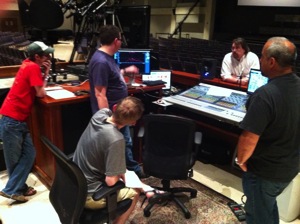
Ongoing Development

Something I probably don’t talk about enough is the great team I get to lead every week. I know a lot of larger churches opt to contract or hire their audio personnel. Given my current staff position, I obviously see this as a good thing. However, while we do have full-time audio staff, the majority of our audio crew every week is comprised of volunteers. Our entire Audio Team for Sunday services at my campus alone for our two main auditoriums is currently 26 people, and two of those 26(myself included) are full-time staff members.
With that many people, you’d be correct in assuming there is a broad spectrum of skill and experience levels in play. Some of our team have been doing audio more years than they’d probably like to admit while some are fairly new. Some of the guys are professionals or former professionals, and then some of them aspire to reach that point one day. One of the bigger challenges of my job is figuring out a way to bring all these different levels of skill and experience together to achieve a consistent sonic experience every week.
It has literally taken me years to figure out some best practices for handling team development, and it’s something I’m constantly refining. My own processes have come from attending seminars and conferences, reading a lot of books and articles, talking through best practices and ideas with our audio staff at other campuses, talking with other audio guys across the country, and finally just plain trial and error. I still, to this day, find myself watching and reading lots of how-to audio stuff mainly to look for good approaches to deliver the information to our team.
The majority of our team development follows an apprentice model and is handled on-the-job. The beauty of this approach is it meets team members where they’re at and filters out a lot of unnecessary info so they can focus on what they need-to-know to get things done.
For example, most new team members start as techs and techs don’t need to know how to EQ a vocal because they don’t work behind a console. So why spend time coaching them on how to EQ a vocal? If they eventually move into a mixing position, we can address it at that time if it even needs addressing; some of the folks who join our team actually come in with a lot of experience and might not need help with EQ. But maybe they will need help with multi-band compression or where we like things to sit in a mix or working with a certain musician or any of a thousand other things that might come up.
Another big win for this approach is it maximizes our crew members’ time. Our audio crew members working backstage are typically on once every three weeks while FOH engineers are often on every other week. That means we get 20 or so opportunities a year to actually develop someone in person, and that happens congruently with making the week happen. Given the wide breadth of information and skills audio can contain, that’s not much time.
Finally, this approach helps spread the goal of team development across our team. It’s simply unrealistic to think that I can spend an equal amount of time with 20+ direct reports. What is better is for me to spend time with guys who can then pass on what I pass on to them.
So what about classes and workshops for the team?
Well, quite frankly, I’ve had mixed success with these over the years. The biggest obstacle to these is time. Remember, only two of us are on staff so that means anything we try and do is competing with 24 other schedules. Our team expresses interest at attending these, but between their own family and work lives that can often be difficult.
The other challenge, again, is that not everybody is at the same level. For example, I’m probably not going to try to get our team together so that I can teach everyone how to wrap a cable over/under.
That said, there are still times I do group or classroom style development. Classroom stuff works good for information I feel like our entire team needs. So if all the cables seem to end up getting stored in varying states of disaster, that might be a sign I DO need to bring everyone in to teach how to wrap a cable over/under.
Classroom style development is also good for meeting a need that a large portion of the team might be asking for. I try and do surveys maybe every year to year and a half to gauge how things are going on our team on the other side of me. These surveys can be a helpful way for me to spot trends to see if there’s something I need to get everyone together to pour into the team. I have a good example of this from just a few weeks ago.
Something a lot of our monitor guys have been asking for help in is EQ. We don’t typically do a lot of processing for monitors so our musicians hear what they really sound like; this is part of our whole “fix it at the source” approach. That said, there are a couple things that do generally need EQ at monitor world–vocals and drums–so I put a date on the calendar to do a little workshop with our team.
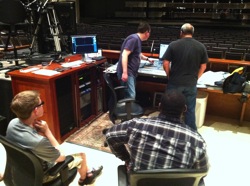
This particular EQ workshop was something I’ve been working on and had hoped to try at a conference first, but I’m glad I was finally able to share it with our team because it also highlighted one of the other reasons I’ll do classroom style development: to share something new. The new thing in this case is the use of a real-time analyzer or RTA.
I think an RTA can be a killer tool. However, as I’ve seen more people using RTA’s, I’ve realized that not too many guys have a good understanding of how to really use these for mixing. I don’t think many guys are really correlating what they’re seeing on the RTA with what they’re hearing. So for the last year or so I’ve been working on some approaches to teaching EQ and RTA’s together as I’ve started implementing RTA’s at our Monitor Worlds which was a request from some of our team.
Something I’ve found over the years is that teaching how to mix typically has more to do with teaching how to listen. I believe an RTA can be a powerful tool in teaching how to listen especially for audio guys who aren’t full time professionals. Based on the reactions I got from our team that night, I think I’m on to something with this.
Anyway, these are just some thoughts, ideas, and approaches I’ve been using to help develop our team.
What kinds of things have you found to work well in your church? How do you find yourself learning the most?

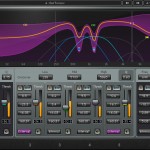 Previous Post
Previous Post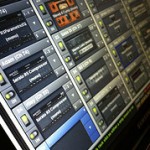 Next Post
Next Post
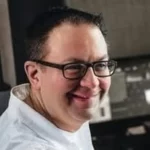


Very interesting. I’ve been attempting to determine a good way to manage my church’s team of volunteers, and recruit and train new ones. We’re a mobile church with a fairly simple setup – Presonus StudioLive 24.4.2 and some wireless gear running into the house system of the event center we rent out, wedges and IEMs mixed by musicians using QMix, and most stage/mic setup duties handled by musicians as well, so a single tech/FOH guy can handle all audio needs for a given Sunday, although having an assistant is nice. Currently we have four people I would consider competent sound guys, as well as a father-son duo that is slowly getting there, so we generally stick to a monthly rotation, depending on everyone’s work/family schedule. What I am struggling with is continuing to develop our current crew, while bringing new people in to eventually be able to handle the same duties themselves. In the next year or so my church is branching to two campuses, and when the time comes I want to make sure we have enough savvy volunteers to make an easy transition.